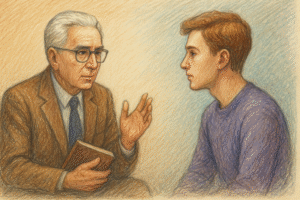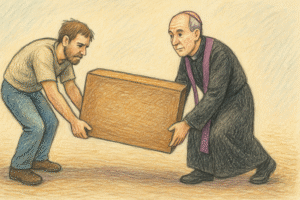On July 31st, 1944, Saint-Exupery took off from the military base “Borgo-Poretta” in Corsica Island (France) on a mission of photographic recognition. He was supposed to take pictures of the coast of “Provenza” in order to prepare the landing of the allies’ troops.
But, while he was flying, Horst Rippert, a German Nazi pilot saw him and shot down his airplane, killing him. Years later, in 2008, in an interview, Horst explained what happened that day: “We were in the area of Toulon. It was a beautiful, sunny day. He was flying 10,000 feet higher than me. I saw his airplane and his tricolor flag and maneuvered to get on his tail and then shot him down. He got in my way and I fired, it was my duty. I didn’t see the pilot and even if I had, it would have been impossible for me to know that it was Saint-Exupery. I have hoped ever since that it wasn’t him,” —he said. “In our youth, at school, we had all read about him. We loved his books; in many of us they awakened the vocation to fly” —he also said. Finally, he ended the interview saying: “If I had known, I would not have opened fire. Not on him!”
“If I had known, I would not have done it…” It is a very common expression, isn’t it? Why? Because our actions always have a side effect. Sometimes (not always of course) that effect (or those effects, because they could be more than one) is/are bad. Many times, we do not consider it or them, we only consider the main effect of our actions and we do not consider the secondary effect/s of our actions. Many times, when we realize about it or them, it is too late.
The same thing happened to Judas. He first wanted money what are you willing to give me…? —he asked. They gave him thirty pieces of silver. But, then when he realized what he did, it was too late: Then Judas, his betrayer, seeing that Jesus had been condemned, deeply regretted what he had done but, Jesus had already been condemned.
It is true that sometimes it is difficult to see some secondary effects. It is also true that we cannot think about all the consequences of our actions, otherwise, we would never act or we would fall into unending scrupulosity. However, it is also true that we can consider at least the immediate side effects, particularly those that can affect our closest neighbors.
But, looking at the secondary effects implies renouncing ourselves in order to care for others. Many times, our desire to do or to say something, etc. comes from our self-love and not from our charity. If we try to do everything out of charity rather than out of self-love, for sure, we would avoid many bad secondary effects. But, we do not consider those effects because of our self-love. Self-love focuses on me (my desires, my feelings, my wanting, my whims, etc.). On the contrary, charity focuses on God and His Will.





